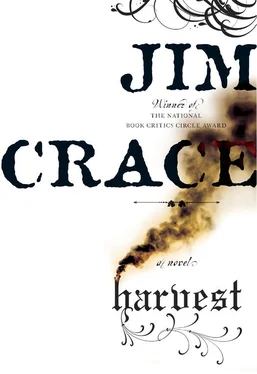It is no different in the gallery upstairs. The walls have been stripped. The fittings have been thrown aside. Even the side room where Master Jordan made his den and where I and possibly the Beldams spent a night has been plundered of every piece of cloth, each coverlet, each cushion and arras. Lucy Kent’s old riding cape has gone. Again, the heavy mattressing has been slashed.
I can’t imagine that the man played much of a part in all of this. Such anger at the trimmings and the trappings of a house not worth the salvaging is woman’s work, I think. A man takes vengeance on the flesh; a woman lashes out at anything that cannot bleed — unless it is an animal, of course, a Willowjack, let’s say. Many times I’ve listened to the tantrums and the arguments of married neighbors in our cottages. The men were woundless come the dawn, though their best breeches or favorite jugs, or possibly their dinners, had been thrown out along the lane with terrifying force. But many of the wives appeared next day nursing their twisted wrists or showing bruises on their faces, or even on one occasion — the Kips again — a scorch mark where William had snubbed out a burning candle in the center of his wife’s forehead. He’d branded her, he boasted. While he was out, she snapped his smoking pipe in half and stamped on all the pieces.
I find myself for the first time in many months in the lobby room at the far end of the long gallery. The spiral staircase here leads up to the attic and the turret, the hideaway where I once made my nest in my first season, before I met my Cecily and moved into the village. Or at least it would lead to that lonely suite of sloping lofts if the supporting timbers had not collapsed into the well with age and rot, and from disuse. The middle section has no treads or flights at all these days. The lower steps are treacherous. There are very few dependable balusters. Only last year at Master Kent’s bidding I roped off the access, just in case any visitor was tempted to ascend — and then found himself descending rapidly, headfirst. Today I see that someone with a knife or sword has cut the rope away. The fibers have not been neatly severed but hacked aggressively. I imagine it will be the work of one of the sidemen, bored perhaps at being stuck in this dull house or, possibly, just trying out his blade after a tedious session with his whetting stone. I would not want to chance those stairs myself but it is clear that someone has, and recently. One of the treads is freshly splintered and I can see where hands have gripped the newel for support leaving traces, of what? Blood, or gravy, or even some of those preserves that have gone missing from the larder downstairs. I reach and touch. I cannot say that the traces are still damp, but they are sticky certainly. I hold my fingers to my nose. The smell is neither sweet nor savory.
I stand in silence, or at least in as much silence as these creaking floorboards will allow. It’s hard to isolate the sounds, to separate the ones coming from my own weight on the boards from those caused by the house itself. A timber house of several stories such as this is seldom absolutely quiet. The building shrugs and breathes. It’s like an old man shifting his hips to make his back more comfortable. A creak might denote not a footstep in the room above but the shifting of the roof frame or the settling of the wood. Still, it’s too late for such sensible opinions. I have already alarmed myself with several possibilities, the main one being that the Beldams have not left the manor yet as I thought but have heard me entering their door and — fearful that the masters have returned — taken refuge in the highest rooms. They’ve left the smudges of their hurriedly abandoned meal on the column of the unsafe stairs. I call out just as I imagined calling out last night when I was hunting for their company, “It’s only Walter, Walter Thirsk …” But of course they do not reply. They would have gone beyond the attic and up the wall ladder into the turret, too far away perhaps to hear my shouts. They will be huddled in the corner of that space and fearful for their very lives.
If I was feeling fitter and less damaged by the only food and drink I’ve had all night and day — the pots of ale, the fairy caps; I haven’t had a crumb besides — I might make a quicker and less noisy job of climbing up these stairs. At least, I could be less fearful. But as it is I feel nothing but foolhardy. If I fall or if the wood gives way, who’s to hear me tumbling and who’s to run down to my aid? And if my clumsy efforts are heard above, what’s to stop the Beldams mistaking me for someone other than myself and standing in the shadows at the top of the stairwell until my head comes into view clearly enough to invite the welcome of a well-aimed kick or a blow from a length of wood? Nevertheless I climb, using the treads and strings at the edges of the stairs as my supports, and always gripping the central newel with at least one hand. I keep on talking too, as I go up, repeating my name, promising that I mean nothing but to forge my peace with them, to thank them even — if they truly were responsible — for getting ready my possessions for the journey out.
The worst part of the stair is the blind stretch reached neither by the downstairs lobby window light nor by the sharper attic light. I have to test each footing with my toes, searching for the most solid timber and then chancing my full weight on it. Only once does my footing fail me. My ankle’s caught in splintered, wormy wood. I hear a piece of it clatter through the maze of stairs below. But after that either the going is easier or, having scared myself enough, I find the courage to proceed with more resolution. The pair of attic rooms is entirely empty except for some of Master Kent’s abandoned junk: a broken chair, broken not by the Beldams but by the weight of Master Kent himself, as I remember, and long ago; some leather riding tack; the great, long travel chest in which I once stored my clothes; the painted child’s cot which sadly was never put to use; a rusty brewing pan. Unlike in the downstairs rooms, however, these items have been left in peace. No one has upturned them, or thrown them about the place.
I turn at once toward the ladder mounted on the wall and climb the twenty rungs up to the trapdoor which will allow me entrance to the turret space. I half expect the trapdoor to be resistant to my push, weighted possibly on its upper side by Mistress Beldam and her husband standing on its boards, opposing me. But it swings open easily and showers me in dust. My eyes, once I have rubbed away the grit, are flooded with the full daylight of the unshuttered turret windows. I pull myself onto my feet, a little breathlessly. The floor is covered with the usual fallen scuff of under-roofs and with the undisturbed remains of bird nests and a waspery. It’s obvious that no one other than myself has been up here for years. The view is mostly chimney pots and roofs. I cannot see into the courtyard, as I intended, to check that my stick and the two travel bags with my glinting silver spoon are safe and where I left them. But I can see out to the orchard and the unbuilt church beyond, and I can see our village roofs and fields.
WHAT STARTS WITH FIRE WILL end with fire, I’ve heard it said. At first I do not spot the plume of smoke which, reluctant to rise on this almost windless day, has gathered on the tool-barn roof. I think at first it could be just a cloud of blackened dust — but dust does not behave as if it’s weightless, dust does not billow or form up in rounded shapes such as those that are now lifting from the roof. Another plume of smoke has started up a little further down the lane toward the cottages, this time from the whitehouse roof. I am as yet not able to make out the unsteady burst and blaze of actual flames or even, from this high vantage point, hear their crack. Now the first of our twenty or so inhabited — let’s say recently inhabited — cottages begins to offer up its smoke. It is the pretty home where Thomas Rogers played his pipe and Anne, his mother, raised her finchy voice. So far the smoke is so thin and undramatic that, if this was only chimney smoke, I might have taken it for nothing more than what was normal for teatime in our village lane, with cooking and a row of blazing hearths. But by the time the fourth and fifth cottages have been set afire, the tool barn and the whitehouse are leaping with orange light, and flames are running up their sides, blackening the wood. And by the time the fourth and fifth cottages are doing the same, the widow Gosse’s home is breathing black and mine is coughing smoke.
Читать дальше












